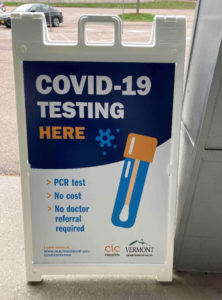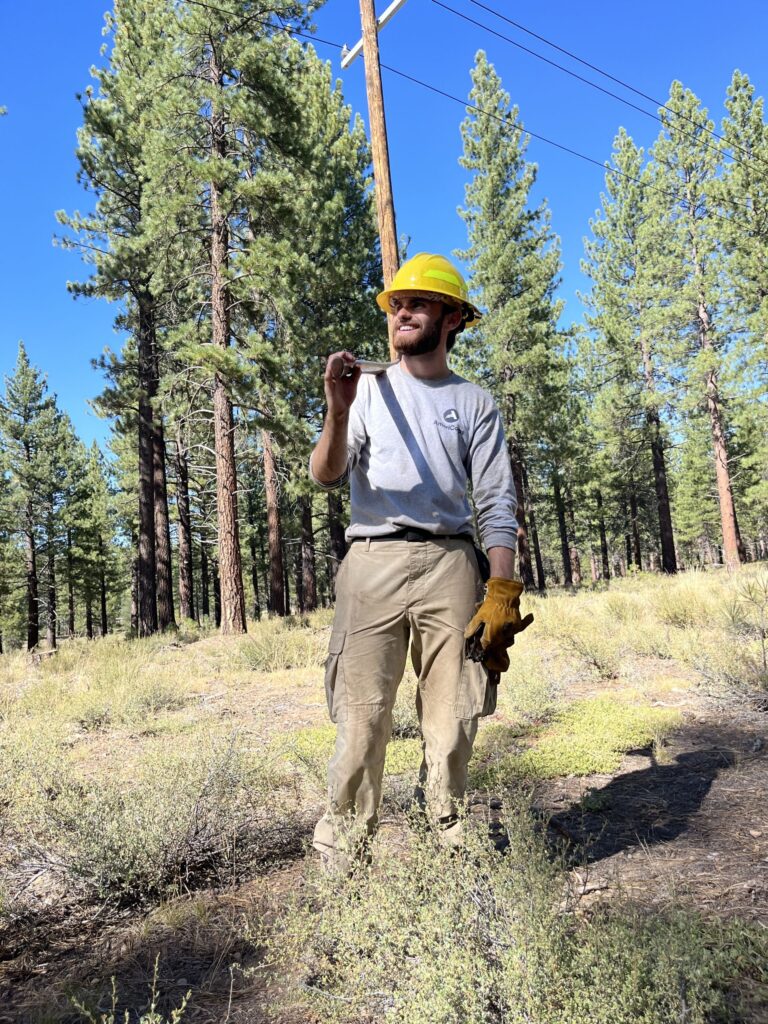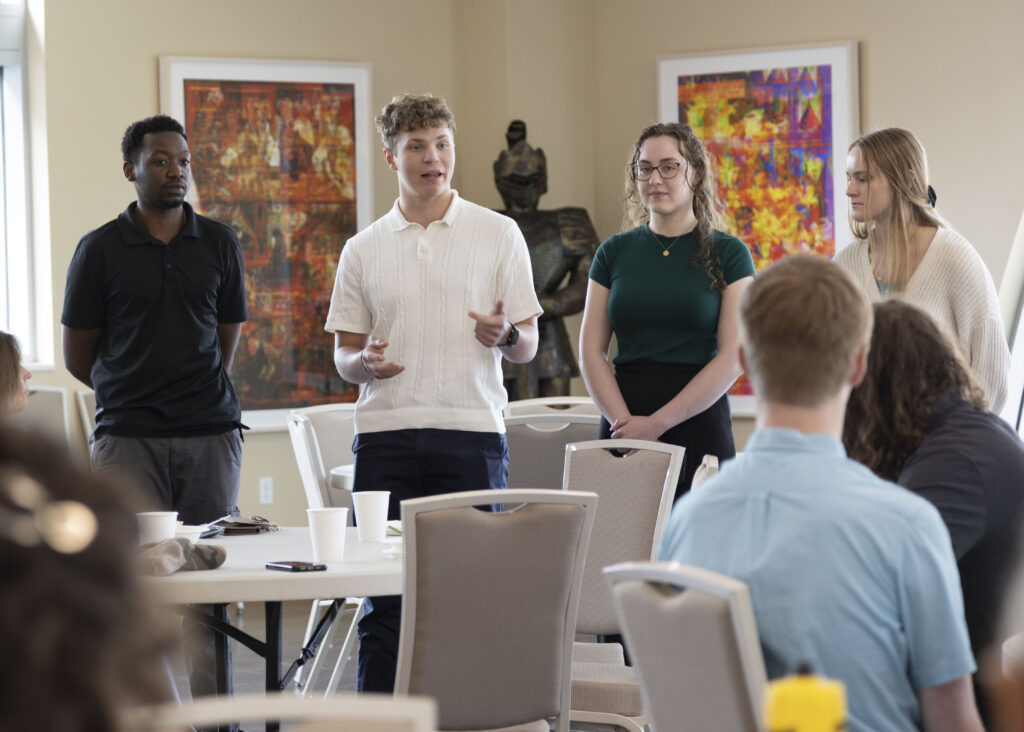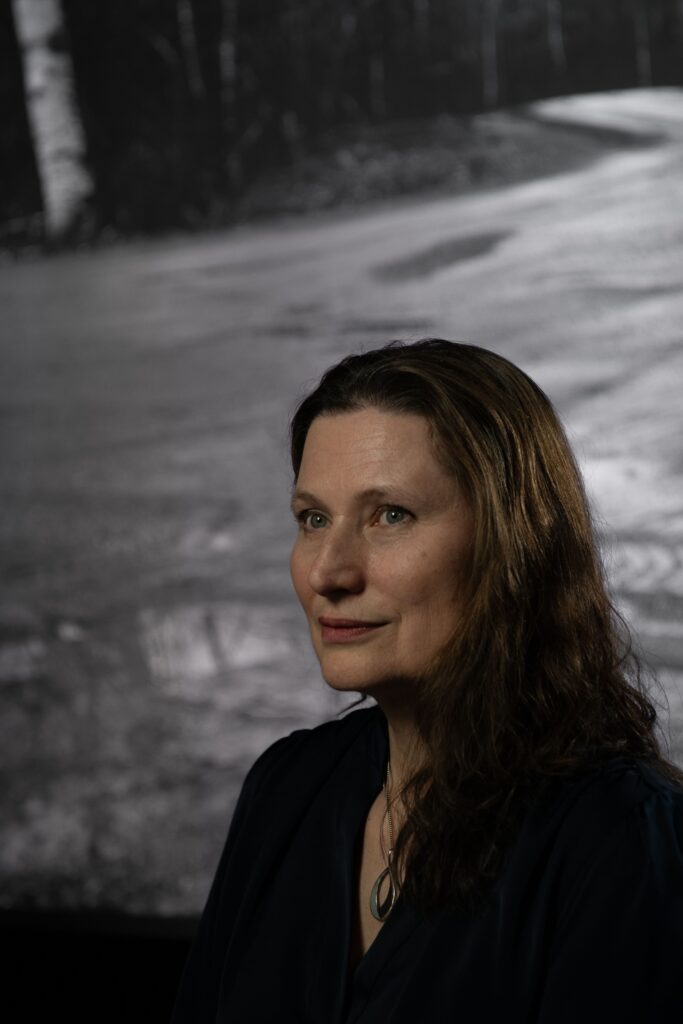COVID test operations build community on, off campus
Many Saint Michael's offices represented among those doing vital work at Winooski's O'Brien Community Center since fall for local residents, including several large New American communities

A recent Saint Michael’s crew staffing the O’Brien Community Center COVID testing site in Winooski were, from left, John Keating, Megan Ohler, Coleen McAuliffe and Sarah Childs.
Leave it to a dedicated staff cohort at Saint Michael’s College – a school that long has hung its hat on service and community – to find a way for getting to know one another better even in a pandemic by serving the wider local population in a time of urgent need.
Close to 30 people — mostly staff from a wide range of departments (but including a handful of Saint Michael’s Fire and Rescue members) — have worked in rotation since fall to oversee and administer COVID testing — on campus for students, but also through a state contract for neighbors in the diverse small next-door city of Winooski a mile or so from campus — seven days a week, at the O’Brien Community Center on Malletts Bay Avenue.
These volunteers say a tangible sense of community means as much or more during a pandemic as in “normal” times, for themselves and the wide range of New Americans and other Vermonters who they typically test – yet, prudent COVID-19 health precautions limit the opportunities for direct and productive community bonding that are so common at Saint Michael’s College most years. Being part of the testing team has been a rich way to stay connected, they say.
Many of the test-site staff workers come from Student Life or Bergeron Wellness Center, although Human Resources, Public Safety, the Adventure Sports Center, and Athletics also are represented. On a typical day, they welcome and sign-in test subjects or gear up in full PPE to guide them through the self-administered tests directly; it’s usually four or five volunteers at a time in Winooski, working with translators in many languages given a relative concentration of recent immigrant communities in Winooski.

One of the interpreters on a recent shift administers his own test.
Said Kerri Leach of Student Life, “I normally wouldn’t get to hang out with our athletic trainers, public safety people and folks from all parts of campus, and opportunities are few during the pandemic with such busy times, but between tests, we have time to chat, and it’s been a real blessing. There are not many silver linings in the pandemic, but this has been one of them for me, and it’s great learning about people’s lives, both the coworkers I’m on duty with and the people who come in.”

Doug Babcock
Doug Babcock, the College’s director of public safety, orchestrated initiatives to make these testing operations happen on and off campus. He said it all came about this past fall when Vermont state health officials were establishing public testing sites throughout the state, with contracts that included a company called CIC Health out of Cambridge, MA – which, as it happens, is a partner with the Broad Institute that already was overseeing testing for the Saint Michael’s campus.
That contract means staff testing-site workers are reimbursed for their Winooski efforts; yet, the workers say their greatest rewards and most compelling motivation go well beyond the modest financial compensation.
James Baker ’17, now a Saint Michel’s Residence Director (RD) for Canterbury and Pontigny residences and coordinator for the Great Housing program, has typically been working in Winooski at the O’Brien Center testing site two to three days a week since fall.

James Baker ’17, a Saint Michael’s Resident Director from Student Life (left), guides alumnus Thomas Friedman ’16 on a COVID test recently.
“A lot of people really appreciate the convenience and access to testing that this site provides them,” said Baker, who finds his former job experience in the hospitality industry useful in his continual interactions with the public.
Babcock said Saint Michael’s top leadership played an essential role in making the Winooski testing site possible. “CICH came to us and asked if we could run the nearby public health site in addition to our campus tests, and our College leaders stepped up over just a few weeks with lots of moving parts and a ton of work by a ton of people.”
Babcock gave a particular shout-out to President Lorraine Sterritt and the vice presidents, who all squarely supported taking on the duty in Winooski – “they saw it as great that we could jump on that,” Babcock said. Particularly helpful, he said, was Rob Robinson, the College’s vice president for finance, who “did a lot of savvy business essentials to make it happen.” The site became operational just after Thanksgiving “and we have staffed that site since” with about 30 people working shifts with differing degrees of regularity.
“We provide four people every day for a six-hour shift, and we are the State of Vermont Public Health Department public testing site in Winooski – the only one,” Babcock said, adding that the only other one in Chittenden County is in Burlington on Pine Street.
The O’Brien Center site is convenient for the many clients who need to walk for their COVID tests since they might not have cars. Babcock said he had been the “site lead” until early April when he learned of being hired for a new Public Safety leadership position at Dartmouth College that starts in late April, so he handed off that site-lead role to Jennifer Corrigan-Drury, the services and engagement coordinator in Public Safety.
Hours for public testing at the Center are Sunday, Tuesday, Thursday and Saturday from 9 a.m. to 3 p.m., and then Monday Wednesday anf Friday from 2 p.m. to 8 p.m. to help those who work different shifts. “It’s a public site and it’s free,” said Babcock. “We have people who test every week and even a couple times a week.” He said Winooski is a particularly interesting site to work with so large a New American population; interpreters on-site or readily available online are essential in the work.

A crew of interpreters one recent day for new American communities in Winooski who come for regular testing.
“The state contracted separately with the interpreters and we have an average of three to four languages each day covered by live interpreters, with resources to do up to 20 other languages on the phone,” Babcock said, noting that Arabic, Swahili, Nepali and French are very common with populations in Winooski from many African nations along with Nepal. “We’ve had days when up to 30 percent of our tests were just from a single community since they typically are very closed communities living in close quarters, so testing is important.”
All the Winooski site workers started out by doing on-campus testing in the Ross and Tarrant centers early fall semester, which “gave us a knowledge base to work from,” said Babcock. The state reimburses the College for the hours these staffers work at the off-campus site. When students came back in session in January, “we had to broaden the pool since everyone had to go back to their day job,” he said.
At least one person on site at the Center each day needs some sort of state licensure – EMT basic is sufficient — to cover possible health concerns, and Saint Michael’s Fire and Rescue leaders or students have been filling that role, along with health services staff from Bergeron Wellness Center. The tests are self-administered rather than the more invasive worker-administered nasal tests at local hospitals, so workers in full PPE just instruct clients on the simple procedure rather than administering it themselves, simplifying the process to the great relief of many initially nervous clients.
Mary Masson, Bergeron Wellness director, and her staff were doing the heavy lifting for testing in the fall, said Babcock, “and athletic trainers have been absolutely crucial too — we built it out from there to be more inclusive of other departments too.” For example, a recent week’s list of workers including counselors Sarah Klionsky from Bergeron, SMFR leaders John Keating and Erik Haversang, Kerri Leach, Brian Lee, Megan Ohler, Jeff Vincent and Catherine Welch from Student Life; Kara Lowe along with trainers form Athletics, Renee Davitt from Human Resources; Sarah Childs of Multicultural Affairs & Services, Todd Johnstone-Wright from the Adventure Sports Center, and others.

The O’Brien Community Center in a file photo.
Babcock said the state contract has been extended to keep the Center going through September with variations in shifts as needed over the summer. Staff get to know regular clients fairly well, said Babcock — such as an elderly new American lady who shared about her family’s life and challenging times recently, “so we were sympathetic and supportive of her and have developed relationships with people inside this process. You see that human empathy really grows quickly.” Some parents bring young children in who may start to squirm or be nervous, and humor or toys or ice cream, or chocolate have helped with that.
Kerri Leach of Student Life gave an example of community-building at the Center: she has developed a good friendship with the women’s soccer coach Wendy Ellis from when they were on shifts together at the Center though they were barely acquainted before.
The Resident Director James Baker said on a typical shift, “I’m the one walking them through the steps of the self-administered test, so I’m wearing the gown, gloves, and face shield.” He did in-person training with Bergeron health staff and some online training through the state before taking on his role, as do many test-site workers. He also helps out in the on-campus testing every Tuesday. Said Baker, “It’s been great we had a chance to help the community – it’s what St. Mike’s does in a way, so I was happy to be asked to do it.”






